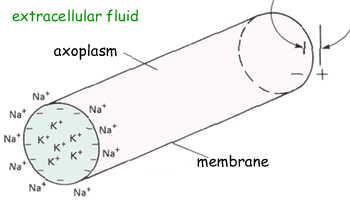Biopotentials
It generally arises from salt concentration differences across cell membranes. These so-called 'membrane potentials' are exhibited by nerve, muscle and gland cells. Membranes are like dividing gauze between two parts of the body – they allow tiny particles through and stop bigger ones from transferring. This means that different concentrations are possible on either side. All living cell membranes pass water, but the solute (solid bit – dissolved in the solvent of water!) transmitted depends on the state and type of membrane. For example, cell membranes of the large intestine pass even large molecules, whereas nerve fibre cell membranes are fine enough only pass the ions of NaCl and KCl (i.e. Na+, Cl- and K+). See action potential.
|
Follow me...
|


 A biopotential is a voltage generated inside the body.
A biopotential is a voltage generated inside the body.


